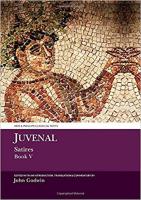
Liverpool (2020) p/b 384pp £29.99 (ISBN 9781789622188)
This substantial edition (similar in scale to the Cambridge Green-and-Yellow series, with added translation) follows G.’s earlier edition of Juvenal, Satires Book IV (2016); these satires have not been edited since E. Courtney’s complete edition of 1980.
The Introduction is in eight sections:
- ‘What is Satire?’ (The poet famously answers this at 1, 85-6);
- ‘Satire before Juvenal’. G. adverts briefly on Lucilius, Horace, and Persius, all very different;
- ‘Juvenal’s Satires—spleen and ideal.’ ‘Juvenal has the anger of a Persius and a Lucilius, married to the poetic skills of a Horace’ … he forges ‘his own unique style of rhetoric, humour and serious thought’: of the four poems in this book, Satire 13 is a consolation to a friend who had been cheated of money, 14 looks at the influence of parents over their children, 15 is a violent critique of the Egyptians, and the incomplete 16 discusses the privileges of the military;
- ‘Juvenal and his times’. We know pitifully little about the poet, who was probably born in the AD 60s, living until circa 130. G. considers, without supporting, the recurrent tale that Juvenal spent some time in Egypt; the threatening figure of Domitian was emperor from AD 81-96.
- ‘Style’. G. rightly gives considerable space to this subject, covering Irony,
Parody, and the ‘Grand Style’, with a full range of literary devices being described and illustrated. - ‘Do these poems have a purpose?’ Are they tongue in cheek or hand on heart? Or a mixture? Readers must decide for themselves—as they must in deciding whether, as has been claimed, Juvenal in these last poems has recovered his early passion.
- Metre. G. considers Juvenal’s use of the hexameter, and in...
- ...he gives a brief account (unfashionable nowadays) of the Transmission of the Text: G. does not discuss the work of earlier editors.
This is followed by a generously full Bibliography—which even includes Kirk Freudenburg’s Satires of Rome—before the text (largely following Clausen’s OCT) is presented with a concise but clear apparatus criticus, and a translation tilted more to accuracy than elegance on the facing page.
In the Commentary, ‘keyed to the English translation’, each of the four poems receives a full introduction, including a list ‘recent’ scholarly work: these lists, not especially formidable, obviate the need for parenthetical references, which so few of us follow up. Indeed, it cannot be said that Juvenal has of late been receiving an excessive amount of attention. It is the task of the commentator to introduce, establish, explain and illustrate the text; these tasks are admirably handled here; indeed, in the case of illustration, we have what can only be described as an embarrass de richesses. Thus, at 13.199, Juvenal alludes to an episode, recounted by Herodotus, involving a Spartan called Glaucus. The allusion is ‘irrelevant’ (Duff), but G. gives us a full page and more; again, at 14.5 Juvenal refers to gambling: G’s note extends to a page and a half (nothing in Duff); G. justifiably pays notable attention to literary tropes (indeed, an Index here lists sixty of them) but at 13.96 an instance of transferred epithet is given no fewer than another seven references. G.’s practice of fully documenting by generous illustration is so prevalent in these pages that the reviewer brought to mind the German scholar who commended J.E.B. Mayor`s ‘extraordinary range of reading’—but here the editor may understandably complain that he should not be criticised for his generosity!
Publishers occasionally allude to ‘senior undergraduates’ as being suitable recipients for a book: such a person, if s/he exists, might well benefit from G.’s impressive range of illustration; but this reviewer suggests that this edition is by a scholar for other scholars to study and, one hopes, benefit from and enjoy. It is hard to imagine that it will need to be replaced before many years to come—and the softback edition represents notably good value for money.
Colin Leach
